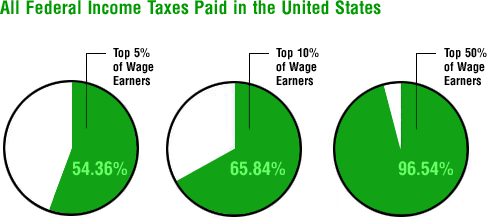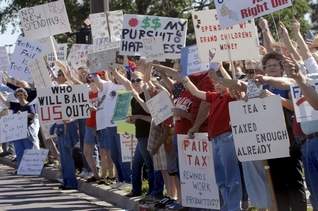Income taxes punish work, stifle innovation (except in ways to avoid a tax liability) and risk-taking. Coming to a network news outlet near you, in addition to all the racial stirrings provoked by the ‘post-racial’ Obama administration, prepare yourself for the next chapter in the Obama administration’s (aka Saul Alinsky) handbook; class envy/warfare.
It comes around in election seasons, which seem to never end nowadays. And it comes around whenever tax reform is discussed in the form of ‘tax cuts for the rich.’
Barring any intervening legislation, these are the numbers by income tax bracket of how the tax rates will change when ‘the Bush tax cuts’ expire.
• Up to $16,750: Rises from 10 percent to 15 percent
• From $16,751 to $58,200: Stays same at 15 percent, but entire bracket pays 5 percent additional on the first $16,750
• From $58,201 to $68,000: Rises from 15 percent to 28 percent
• From $68,001 to $137,300: Rises from 25 percent to 28 percent
• From $137,301 to $209,250: Rises from 28 percent to 31 percent
• From $209,251 to $373,650: Rises from 33 percent to 36 percent
• $373,651 and up: Rises from 35 percent to 39.6 percent
The spreadsheet below shows how much more of your income (not counting all the income credits and re-distribution schemes contained in the 75,000+ page Internal Revenue Code) you will owe Uncle Sam on every dollar you earn beginning January 1, 2011. Note the gimmick in the second tax bracket, where the poor and not as poor ‘working people’ reside. You know, the one class that Obama claims to advocate for. These brackets capture the majority of the income earning population. The tax rate remains the same, but the entire bracket pays 5 percent additional on the first $16,750. The consequence of this magic trick is putting the largest tax burden, as a percentage of income, square on the backs of the poor. The rate of increase on the next bracket, those whose income falls between $58,201 and $68,000, goes up by a massive 86.67 percent. The so-called ‘working people.’ I add ‘so-called’ to the discussion because this administration would like the dumb masses to believe that rich people don’t work. ‘Working people’ is class envy for the poor aimed at the rich, by the ‘uniter’ himself. It is a necessary function of class envy, which this administration so effortlessly employs. And so far gets away with.
| From $ | To $ | From % | To % | $ Increase | % Increase | Increase as % of Income |
| $0 | $16,750 | 10.00% | 15.00% | $838 | 50.00% | 5.00% |
| $16,751 | $58,200 | 15.00% | 15.00% | $9,568 | 0.00% | 16.44% |
| $58,201 | $68,000 | 15.00% | 28.00% | $8,840 | 86.67% | 13.00% |
| $68,001 | $137,300 | 25.00% | 28.00% | $4,119 | 12.00% | 3.00% |
| $137,301 | $209,250 | 28.00% | 31.00% | $6,278 | 10.71% | 3.00% |
| $209,251 | $373,650 | 33.00% | 36.00% | $11,210 | 9.09% | 3.00% |
| $373,651 | $500,000 | 35.00% | 39.60% | $23,000 | 13.14% | 4.60% |
| Obama’s Tax based on his 2009 income. | $5,505,409 | 35.00% | 39.60% | $253,249 | 13.14% | 4.60% |
Don’t be fooled by the tax brackets or these numbers either. They give the illusion that everybody is actually paying taxes. Everyone is not paying taxes. The truth is, for 2005, the top 1% of income earners paid 39% of all tax revenue. That’s up 2% since President Bush took office in 2000. 86% of all federal income taxes were paid by the top 25% of income earners. And 97% of all taxes paid are paid by the top 50% of income earners.

The power to use the ‘tax hammer’ to micro-manage voting, social and economic behavior is the drug the politicians must be weaned from. The FairTax takes that tax hammer away by putting the economic power where it belongs, with the people. All the people. Not Washington politicians and lobbyists. Because the FairTax is transparent, the FUD factor goes away. The Fear, Uncertainty, and Doubt goes away, and citizens and entrepreneurs can make business decisions with some certainty of risk and tax consequences.
The FairTax unleashes the potential for economic activity, innovation, job creation, personal wealth and financial security without the interference of Washington and without increasing the national debt. And as a not insignificant side effect, the class warfare game with taxation becomes a thing of the past. Allowing the elected officials to concentrate their efforts to serving their constituents instead of trying to rob them.
 I saw a lot of enthusiasm on their faces and in their voices. It tells me this isn’t a one-day phenomenon. As for the FairTax, there were a lot of supporters out there that brought their own signs. And it was more than just Huckabee supporters.
I saw a lot of enthusiasm on their faces and in their voices. It tells me this isn’t a one-day phenomenon. As for the FairTax, there were a lot of supporters out there that brought their own signs. And it was more than just Huckabee supporters.